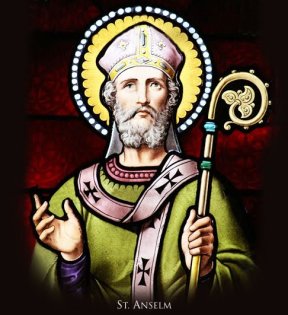
 VERY SAINT HAS A FEAST DAY at some point throughout the year on which the Church celebrates his or her life, work, and sanctity. Today, April 21st, is the feast of St. Anselm, the great philosopher and theologian of the eleventh century for whom my parish is named. Because he is our parish patron, today is a Solemnity for us here in northeast Philly.
VERY SAINT HAS A FEAST DAY at some point throughout the year on which the Church celebrates his or her life, work, and sanctity. Today, April 21st, is the feast of St. Anselm, the great philosopher and theologian of the eleventh century for whom my parish is named. Because he is our parish patron, today is a Solemnity for us here in northeast Philly.
Anselm is truly one of the great thinkers in Church history. For this reason, he is one of the “Doctors of the Church.” He wrote numerous very important theological texts, each of which is worthy of our study. For now, though, let’s consider just one of Anselm’s brilliant ideas.
St. Anselm had a sort of motto that sums up a good bit of his life and teaching. In Latin, the famous motto is: fides quarens intellectum. In English, that literally means: “faith seeking understanding.” That certainly sounds nice and pious, but what does it mean? What does it matter?
It means that faith comes before understanding. We don’t have to understand God in His entirety in order to have faith. Faith comes first, and then it leads us to deeper understanding. We see this so clearly in the Easter season. When Mary Magdalene & Peter & John went to the tomb and found it empty, they certainly did not understand everything that had happened. But, the Scriptures tell us that they “saw and believed” (John 20:8). Their lack of understanding didn’t keep them from having faith. Rather, they began with faith, which led them to greater understanding at Pentecost and in the days & weeks that came after.
We have to be careful, though. It’s not good enough to say, “I have faith, so I don’t really need to understand.” Not at all! Remember, the motto is “faith seeking understanding.” So, yes, we begin with the virtue of faith, which is paramount, but we must absolutely seek deeper understanding.
Think about your own faith. What have you done lately to nurture that faith, to seek understanding?
§ Have you thought about reading a little bit out of your Bible?
§ Have you made the effort to participate in Advent & Lenten adult faith formation events at your parish?
§ Does your family own a catechism?
§ Have you ever stopped to make a visit at an adoration chapel in your area?
We need to move beyond the idea that graduating from Catholic school or receiving Confirmation prepares us with everything we need to know about our faith. Personally, I went through 21 years of Catholic school, and I know I still have room to grow and learn.
Our faith seeks understanding. Is that statement true for us? There are still more than six months remaining in this “Year of Faith” that we are celebrating as a Universal Church. What could your parish do, and what could you do individually, to seek greater understanding of our holy Catholic faith?
